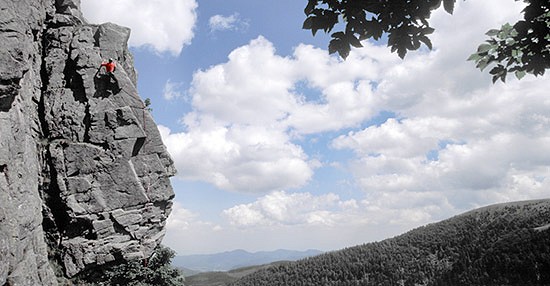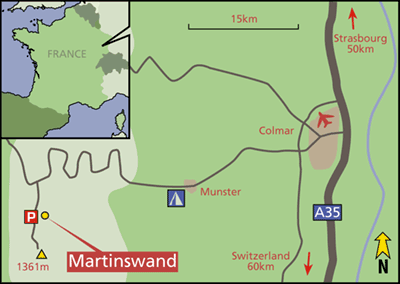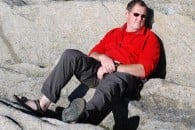Heading for the Alps this summer and fancy a stop-off on the way south – how about considering a breaking the journey with couple of days at the fine granite cliff of the Martinswand in eastern France?
The central section of the broad Rhine valley is bounded by the high parallel hills of the Black Forest on the German side, and the Vosges on the French. The Vosges consists of a series of high rolling granite hills poking above the steep forested flanks – several of which are known with good reason as Ballons (they look like huge balloons from a distance), rising to a height of 1400m. A short distance from the high baldpate of Hohneck (1362m) lurks a fine granite crag – the Martinswand - tucked in the back of a deep rounded corrie, wouldn't look out of place in Wales.
(A little aside: A small plaque on top of Hohneck celebrates the passing of a message, using a heliograph, to the Aigulle du Midi above Chamonix 250 kilometres away).
The cliff is only short distance off the south-bound route from the English Channel to Switzerland and is a great spot to break the journey to the Alps. It is 60km north of the Swiss border and the area can be reached in a longish day from the Channel Ports. Probably the best route is via Luxembourg, ensuring both cheap petrol and the use of toll free motorways.
There is an excellent and inexpensive municipal campsite in Munster, with other flashier (and more expensive ones) scattered throughout the Vosges; and the old town is well worth exploring, with the real oddity of stork's nests on top of many of the taller buildings.

The Martinswand is up to 100m high and has a good spread of grades, with many easier climbs following strong natural lines, and a set of harder routes up the faces in between. All the decent routes are well-bolted so the trad rack can be left in the boot of the car.
The cliff is approached from above, which is very civilised, a short walk across a flower-spangled meadow and the rock pyramid of the Petite Cervin appears, poking up from the cliff. It is possible to gear up at the cliff top and descend to the routes, though I have always preferred to take the gear down the stony gully to the base of the cliff, spend the day climbing on the lower walls then do one of the longer easier routes as a way out, carrying the rucksack – all good practise for the Alps.
The buttresses face east and so go out of the sun in the afternoon, a useful arrangement when the weather is hot. Situated at the head of a steep cwm there is often a cooling breeze blowing up the cliff, improving its attraction as good summer venue even further. The area is often snow-bound in winter, offering good ski-touring across the tops, it might even make a viable venue for snow and ice climbing!
If you end up enjoying the place there are several other pleasant granite cliffs scattered around and there are also the sandstone outcrops of the Guebershwihr. These are situated down towards the motorway, and although at a much lower altitude than Martinswand, they are well sheltered by the trees and make a decent venue in hot weather. Bolted sandstone always feels a bit 'naughty' but I guess – when in Rome??..!

Guidebook
Topo d'Escalade de Vosges Sud, by the Club Alpin Francais, can be bought in the bookshops in Munster for €20, it covers the Martinswand and half-a-dozen other cliffs in the immediate area. Most are easy of access and offer predominantly sport climbs.
Shopping?
Munster is well supplied with smaller shops and has couple of decent sized supermarkets.
Distractions?
There is excellent hill walking through the high tops of the Vosges, as well as mountain biking. Many of the lakes are set up as summer swimming hollows. For something more sobering, the area is peppered with cemeteries from the two World Wars that washed backwards and forwards over this delightful area, call in and pay your respects. If you have a bike with you, then the Route des Cretes - a ridge-top road built during the War - gives a fantastic day's cycling, with stunning views to either side, culminating in an ascent of Le Grand Ballon.
advert() ?>



Comments